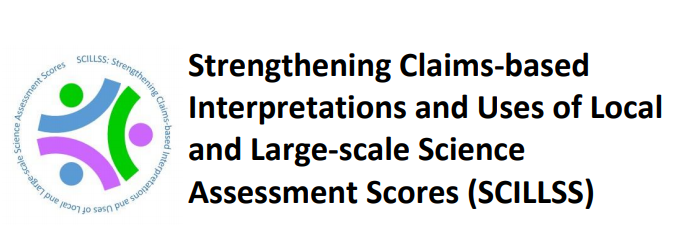Digital Workbook on Educational Assessment Design and Evaluation: Creating and Evaluating Effective Educational Assessments

SCILLSS Logo
Digital Workbook on Educational Assessment Design and Evaluation: Creating and Evaluating Effective Educational Assessments
This professional development assessment literacy resource is divided into chapters and is intended to help educators ensure that the assessments they use provide meaningful information about what students know and can do.
Chapter 1: Purposes and Uses of Assessment Scores, Validity, Validity Questions (Adobe Connect Digital Workbook, PPT, Script, MP3)
- Chapter 1.1 Assessment Purposes and Uses
- Chapter 1.2 Validity as the Key Principle of Assessment Quality
- Chapter 1.3 Four Validity Questions to Guide Assessment Development and Evaluation
- Chapter 1.4 Summary and Next Steps
Chapter 2: Construct Coherence (Adobe Connect Digital Workbook, PPT, Script, MP3)
- Chapter 2.1 Review of Key Concepts from Chapter 1
- Chapter 2.2 The Concept of Construct Coherence
- Chapter 2.3 Validity Questions Related to Construct Coherence
Chapter 3: Comparability (Adobe Connect Digital Workbook, PPT, Script, MP3)
- Chapter 3.1 Review of Key Concepts from Chapters 1 and 2
- Chapter 3.2 What is Comparability and Why is it Important?
- Chapter 3.3 What is Reliability/Precision and Why is it Important?
- Chapter 3.4 Validity Questions Related to Comparability and Reliability/Precision
Chapter 4: Fairness and Accessibility (Adobe Connect Digital Workbook, PPT, Script, MP3
- Chapter 4.1 Review of Key Concepts from Chapters 1, 2, and 3
- Chapter 4.2 What is Fairness and Accessibility and Why is it Important?
- Chapter 4.3 Validity Questions Related to Fairness and Accessibility
Chapter 5: Consequences Associated with Testing (Adobe Connect Digital Workbook, PPT, Script, MP3)
- Chapter 5.1 Review of Key Concepts from Chapters 1, 2, 3, and 4
- Chapter 5.2 Consequences Associated with Testing
- Chapter 5.3 Validity Questions Related to Consequences
